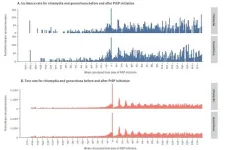(Press-News.org) Everyone indulges in wishful thinking now and again. But when is that most likely to happen and when could it actually be harmful? A new study, led by the University of Amsterdam (UvA), demonstrates unequivocally that the greater the insecurity and anxiety of a situation, the more likely people are to become overly optimistic – even to the point where it can prevent us from taking essential action. The study's results have now been published in the journal American Economic Review.
‘People aren't purely truth-seekers - many beliefs are influenced by emotions and driven by what is pleasant or comforting. Like belief in an afterlife or optimism about health outcomes,’ says Joël van der Weele, professor of Economic Psychology at the UvA. Working alongside professor of Neuroeconomics Jan Engelmann and an international team, Van der Weele set out to answer whether people become overly optimistic when facing potential hardships. ‘So far studies haven't provided clear evidence for wishful thinking, with many not backing up the idea,’ explains Engelmann. ‘But these mainly focused on positive outcomes, like winning a lottery. We examined how both positive and negative outcomes influence biased beliefs.’
Choosing the most pleasant outcome
Understanding self-deception and its causes is difficult in real-world situations. The study involved a set of experiments with over 1,700 participants, conducted in a lab and online. Participants were briefly shown various patterns, such as sets of differently oriented stripes or coloured dots, and were asked what kind of pattern they saw. Some of these patterns were linked to a negative outcome to induce anxiety, either a mild and non-dangerous electrical shock (in the lab) or a loss of money (online). ‘We wanted to see if people make more mistakes in recognising patterns associated with a negative outcome, thinking it was actually a harmless pattern. That would indicate wishful thinking,’ explains Van der Weele.
The study consistently found that participants were less likely to correctly identify patterns associated with a shock or loss. ‘The participants tended to see a pattern that aligned with what was more desirable,’ Engelmann says. ‘Previous research looked at wishful thinking related to positive outcomes and found mixed results, with many studies not finding an effect. Our study demonstrates very clearly that the negative emotion of anxiety about an outcome leads to wishful thinking.’
Making people more realistic
The researchers also tested interventions designed to make people more realistic. The first involved making the patterns easier to recognise. ‘Reducing uncertainty did indeed turn out to reduce wishful thinking,’ says Van der Weele. The second intervention was to offer higher potential earnings for correct pattern recognition. This intervention had little effect, except when participants could gather more evidence about the exact pattern they were shown. ‘When people had more time to collect evidence and were better rewarded for a correct answer, they became more realistic,’ explains Engelmann.
Finally, in the experiments where negative outcomes were replaced by positive outcomes, participants showed no wishful thinking. According to the authors this shows that reducing negative emotions can lessen overoptimism.
Wishful thinking in the ‘real world’
The authors recognise that wishful thinking can be useful because it helps us deal with bad feelings and manage uncertainty. Engelmann: ‘Wishful thinking is important for humans in coping with anxiety about possible future events.’ For Van der Weele and Engelmann, the concern is situations in which too much optimism stops people from getting the information they need or from acting in a way that would benefit them. ‘People can get too hopeful when things are uncertain. We observe this happening with climate change, when financial markets fluctuate, and even in personal health situations when people avoid medical help because they think everything will be fine. We need to know more about when wishful thinking helps and when it hurts.’
Contact
Joel van der Weele: j.j.vanderweele@uva.nl
Jan Engelmann: j.b.engelmann@uva.nl
END
Making the future too bright: how wishful thinking can point us in the wrong direction
2024-03-28
ELSE PRESS RELEASES FROM THIS DATE:
Ochsner Health named to Newsweek’s America’s Greatest Workplaces 2024 for Job Starters
2024-03-28
NEW ORLEANS, La – Newsweek and Plant-A Insights Group have named Ochsner Health one of America's Greatest Workplaces for Job Starters in 2024. In a survey that included more than 75,000 young professionals and more than 540,000 company reviews, Ochsner earned 5 out of 5 stars. As the leading not-for-profit healthcare provider in the Gulf South, Ochsner is committed to championing career development among new professionals.
"We at Ochsner are honored to receive recognition as a place of employment that offers ...
Three-year study of young stars with NASA’s Hubble enters new chapter
2024-03-28
In the largest and one of the most ambitious Hubble Space Telescope programs ever executed, a team of scientists and engineers collected information on almost 500 stars over a three-year period. This effort offers new insights into the stars' formation, evolution, and impact on their surroundings.
This comprehensive survey, called ULLYSES (Ultraviolet Legacy Library of Young Stars as Essential Standards), was completed in December 2023, and provides a rich spectroscopic dataset obtained in ultraviolet light that astronomers will be mining for decades to come. Because ultraviolet light can ...
North Carolina takes the lead in PFAs research with Collaboratory’s $3 million investment to expand the state’s research capacity
2024-03-28
WILMINGTON, N.C. (March 27, 2024) – The North Carolina Collaboratory – an organization dedicated to advancing scientific research for policymaking within North Carolina – today announced its partnership with Thermo Fisher Scientific to advance the State’s per- and polyfluoroalkyl substances (PFAS) research capabilities. Supported by critical appropriations from the North Carolina General Assembly (NCGA), the Collaboratory purchased five state-of-the-art mass spectrometers that continue to position North Carolina at the forefront of academic PFAS research nationally. This new partnership ...
Is it the school, or the students?
2024-03-28
Are schools that feature strong test scores highly effective, or do they mostly enroll students who are already well-prepared for success? A study co-authored by MIT scholars concludes that widely disseminated school quality ratings reflect the preparation and family background of their students as much or more than a school’s contribution to learning gains.
Indeed, the study finds that many schools that receive relatively low ratings perform better than these ratings would imply. Conventional ...
Exploring the relationship between HIV pre-exposure prophylaxis and the incidence of chlamydia, gonorrhea and syphilis – findings from Denmark
2024-03-28
In their research article published in Eurosurveillance, von Schreeb et al. challenge existing assumptions regarding the relationship between the use of HIV pre-exposure prophylaxis (PrEP) and the incidence of bacterial sexually transmitted infections (STI). According to the concept of sexual risk compensation, the start of PrEP treatment – a drug regimen which effectively prevents acquiring HIV – is associated with rises in STI as people feel protected against HIV while using it. However, von Schreeb et al. argue that available ...
Music: Song lyrics have become simpler and more repetitive since 1980
2024-03-28
We have been alerted to a potential error in some of the coding used by the authors in their analyses and are looking into this as a matter of urgency. The authors are confident that the main findings of the paper will remain unaltered, however some aspects may be affected and we have removed two sentences from the press release to reflect this. We will provide an update if there are further developments. We apologise for any inconvenience caused.
The lyrics of English-language songs have become simpler and more repetitive over the past 40 years, according to a study published in Scientific Reports.
Eva Zangerle and ...
Environment: More than half of Colorado River’s water used to irrigate crops
2024-03-28
Irrigation for agriculture uses more than half of the Colorado River’s total annual water flow, reports a paper published in Communications Earth & Environment. This finding is part of a new comprehensive assessment of how the Colorado River’s water is consumed — including both human usage and natural losses — and provides a more complete understanding of how the river’s water is used along its over 2,300 km (almost 1,500-mile) length.
The Colorado River flows through the southwestern United States (including the Grand Canyon) and northwestern Mexico whilst supplying water to more than 40 million people and more than 2 million ...
When inequality is more than “skin-deep”: Social status leaves traces in the epigenome of spotted hyenas in Tanzania
2024-03-28
A research consortium led by scientists from the Leibniz Institute for Zoo and Wildlife Research (Leibniz-IZW) provide evidence that social behaviour and social status are reflected at the molecular level of gene activation (epigenome) in juvenile and adult free-ranging spotted hyenas. They analysed non-invasively collected gut epithelium samples from both high-ranking and low-ranking female hyenas and showed that rank differences were associated with epigenetic signatures of social inequality, i.e., the pattern of activation or switching off of genes that regulate important physiological processes such as energy conversion and immune response ...
Study explores the future of at-home cancer treatment
2024-03-28
LOS ANGELES — A clinical trial from Keck Medicine of USC will test the feasibility of treating non-small cell lung cancer with immunotherapy provided at home.
Immunotherapy, medicines that use the body’s immune system to eliminate or control cancer cells, are effective for many cancer patients, but are currently only administered intravenously (into the vein) in a doctor’s office or hospital.
The study will examine if a new formulation of atezolizumab, an immunotherapy approved for treating certain types of non-small cell lung cancer, can instead be safely and effectively ...
First performance standards published to measure the effectiveness of lifestyle medicine treatments
2024-03-28
An expert panel has published the first performance measures to identify remission and evaluate the effectiveness of lifestyle medicine treatments, which will allow more objective comparisons between lifestyle behavior interventions and other non-lifestyle treatments.
The performance measures are significant because, as interest in the field of lifestyle medicine has grown, it became clear that the lack of standards to document remission or long-term progress following lifestyle medicine treatment was a barrier to the widespread integration of the ...



